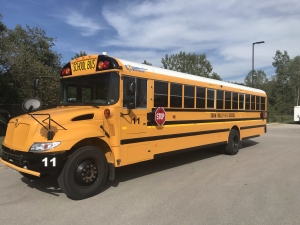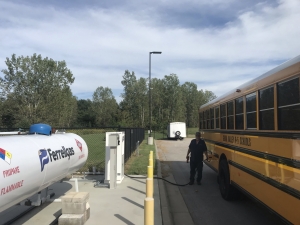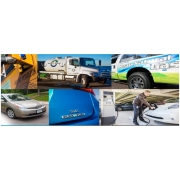Case Study: School District’s Propane Buses Go Beyond Cost Savings
District: Grain Valley School District
Industry: Education
Location: Grain Valley, Missouri
Vehicles: (14) 2018 IC Bus CE Series propane autogas-fueled buses
Fueling: On-site propane autogas station
Challenge
With aging diesel buses to replace, a Missouri school district looked to alternative fuel options that would save money on fuel and maintenance.
Result
The Grain Valley School District purchased 14 propane school buses. The new buses joined a 49-bus fleet that transports 2,800 students to school from subur ban and exurban neighborhoods.
ban and exurban neighborhoods.
Focus on Cost-Cutting
Over the years Missouri state reimbursements for school transportation have dropped from 75 percent to 16 to 20 percent. School districts in the state have had to tap their own general school funds to make up the shortfall.
To help save money, the Grain Valley district considered alternative fuels for its new school buses and comparing compressed natural gas (CNG) and propane autogas. District representatives attended an alternative fuels workshop hosted by Kansas City Regional Clean Cities, a Metropolitan Energy Center program. The district considered various fuels but “the vehicle costs and fueling station costs for CNG were much higher versus propane,” said Shawn Brady, director of transportation.
The district decided to purchase 14 propane buses in 2018 to replace diesel buses of 2001 and 2002 model years. Brady researched and applied for a grant from the U.S. Department of Energy through Kansas City Regional Clean Cities to assist with the purchase costs of the buses.
Preparing for Propane Autogas
To fuel the new buses, the district entered into a contract with their local propane provider, Ferrellgas. A fueling station with two 1,000-gallon tanks was built in the school district’s bus parking lot in April 2018. “It saves time not to have to travel to refuel,” Brady noted.
Infrastructure costs for propane are the lowest of any fuel; alternative or conventional. For Grain Valley schools, the start-up cost for the fueling station totaled $16,500. “We received a 45 percent grant from Metropolitan Energy Center for the installation of our propane fueling station,” Brady said. The center’s grant amounted to $7,425. “The fueling station cost us only $9,075 after the grant.”
Before putting the new buses on the district’s routes, drivers received training in propane bus operation. “Our bus vendor provided training on how to properly operate the buses and maximize fuel efficiency,” Brady said. The district’s technicians traveled to the bus manufacturer’s factory in Tulsa, Oklahoma, for a complimentary week-long training course on maintenance. The district didn’t need to make changes to its bus repair facility. Requirements for a propane vehicle service facility are generally the same as those for conventionally fueled vehicles.
Financial Benefits
After tapping grants for purchase assistance, each new bus cost about $250 more than a comparable diesel bus. District officials say that the higher initial cost can be quickly recouped in fuel savings.
In fact, by adding propane buses to its fleet, Grain Valley School District has noted savings on both fuel and maintenance. On average, propane autogas costs up to 50 percent less than diesel. As part of its  negotiated contract, Grain Valley paid a locked-in rate of $1.20 per gallon of propane in 2018-1019. For the 2019-2020 school year, the district pays $1.15 per gallon. For comparison, the district pays $2.31 per gallon on average for diesel.
negotiated contract, Grain Valley paid a locked-in rate of $1.20 per gallon of propane in 2018-1019. For the 2019-2020 school year, the district pays $1.15 per gallon. For comparison, the district pays $2.31 per gallon on average for diesel.
Each bus in the district runs about 9,000 miles per year. For the 2018-2019 school year, fuel savings amounted to about $14,500. “The district’s increased savings year after year will allow the transportation department to serve as a better steward of taxpayer money,” said Brady.
Additional savings come from the reduced maintenance. With propane autogas, no exhaust after-treatment or diesel emissions fluids are required like with diesel to meet today’s strict emissions regulations. Propane vehicles don’t need particulate trap systems, turbochargers and intercoolers. Plus, propane uses less engine oil. All these factors contribute to the overall savings of time and money. The district’s technicians like the propane buses, Brady reports. “There are fewer parts and systems to have to maintain.”
However, Brady explained that “warranty work is challenging with no established shop in Kansas City.” He noted that IC does provide a traveling technician who assists his staff when they encounter maintenance issues. Kansas City Regional Clean Cities recommends fleet managers ensure that there is a local service shop to do warranty and continuing work on buses before purchasing.
Even more saving shows up for the district in the winter. Due to the chemical properties of propane autogas, the propane buses warm up faster and have no cold start issues. Unlike diesel vehicles, these buses can start up in temperatures as low as -40 degrees Fahrenheit. School districts report lower electric costs because the propane buses don’t rely on block heaters. “Our propane buses warmed up faster this past winter than the diesel buses,” Brady said.
Beyond the Bottom Line
Grain Valley’s propane buses are helping the community’s air quality. Unlike diesel buses, propane vehicles emit virtually no particulate matter and, with substantially less nitrogen oxides (NOx). Buses fueled by propane also emit fewer greenhouse gases and total hydrocarbon emissions when compared to diesel buses. Propane’s quiet operation makes riding the bus more pleasant for passengers and safer for drivers, who are less distracted by engine noise. “We’ve benefitted from much cleaner air and much quieter buses running through neighborhoods,” said Brady.
Drivers also report that the propane dispenser pumps are just as fast or faster than the diesel fuel pump when it’s time to fill the tank. The district notes that it will be sure to order buses with 100-gallon fuel tanks going forward. “These were not available from IC when we placed our first order,” Brady said.
The district’s leadership in adopting an alternative fuel earned it a 2018 Agent of Change Award from the Metropolitan Energy Center, a Kansas City nonprofit catalyst for energy efficiency, economic development and environmental vitality.
The district’s plan to purchase seven more propane buses this year, and eventually move to an all-propane fleet, speaks to the administration’s belief in the benefits of this alternative fuel for their students, drivers and overall community.
“Our district made the decision on propane buses to save money. The environmental impact is an added benefit. There’s no reason to not make the move into propane now,” Brady said.

About MOPERC: The Missouri Propane Education & Research Council is a not-for-profit organization authorized by the Missouri Legislature. Dedicated to propane education and public awareness, MOPERC provides industry training, consumer safety, appliance rebates and market development programs. The council is composed of 15 volunteer directors and adm inistered by an executive staff. Visit PropaneMissouri.com.



 Dennis Schroeder / NREL
Dennis Schroeder / NREL 